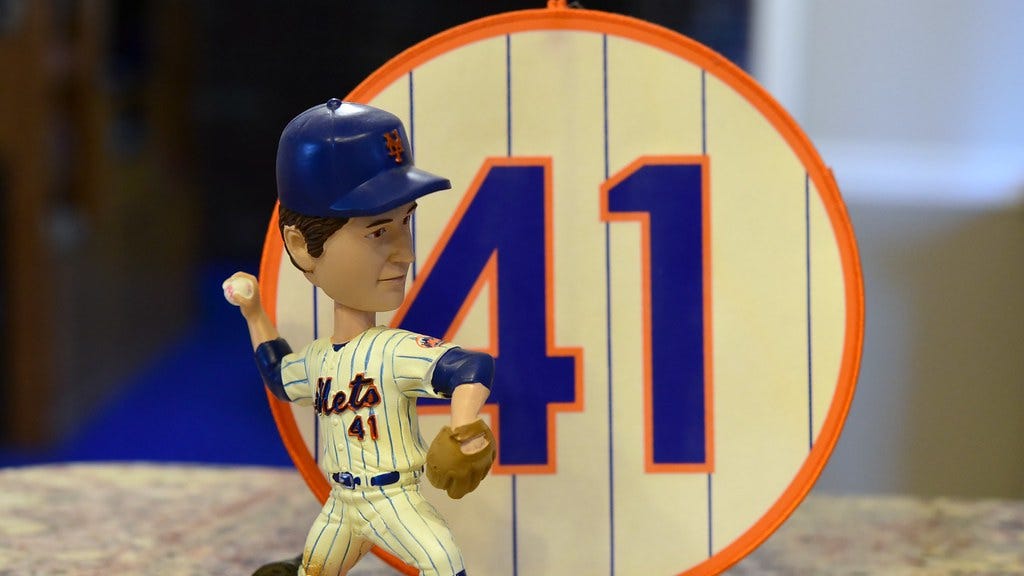Putting the Peasants in their Place
The more you look at the Tom Seaver debacle, the worse it gets.

In doing my research for Wednesday’s piece on the New York Mets at the trade deadline, I came across an excellent recounting of the June 1977 “Midnight Massacre” by Bill Madden of the New York Daily News. The antagonism between Tom Seaver and Team President M. Donald Grant over his contract was linked to MLB’s labor negotiations in 1976, talks that resulted in the creation of free agency as we know it. Seaver was the team’s labor representative, and Grant was so incensed at the result of the talks that he nearly traded Seaver to the Los Angeles Dodgers for Don Sutton.1
As the franchise headed into the winter after the 1976 season, Seaver expected the front office to spend some money to supplement the Mets offense. The team had won 86 games in 1976, the second highest total in franchise history at the time, but still a whopping 15 games behind the Eastern Division champs, the Philadelphia Phillies.
The Mets pitching staff was the best in the National League, headlined by Seaver, Jerry Koosman and Jon Matlack. It led the league in shutouts, complete games and strikeouts. But the team was seventh in runs scored and had stupidly dealt Rusty Staub after the 1975 season. Rusty had set a team record with 105 rbi that season, and thought he deserved more money.2 That didn’t sit well with Grant, so Rusty was gone.
The Mets were were very profitable, and when they completely sat out free agency, Seaver didn’t stay quiet. He wanted the Mets to acquire centerfielder Gary Matthews, who eventually signed a five-year, $1.2 million contract with the Atlanta Braves. At Spring Training in February 1977, Seaver told reporters, “How can you not even try?”
But what made my blood boil were comments Grant made to Seaver face to face that set the stage for his departure. Here’s what Seaver, who would die of complications from Lewy body dementia and COVID-19 in 2020, recalled to Madden in 2007.
"There are two things Grant said to me that I'll never forget, but illustrate the kind of person he was and the total 'plantation' mentality he had," Seaver says. "During the labor negotiations, he came up to me in the clubhouse once and said: 'What are you, some sort of Communist?' Another time, and I've never told anyone this, he said to me: 'Who do you think you are, joining the Greenwich Country Club?' It was incomprehensible to him if you didn't understand his feelings about your station in life."
What happened next is better known. Grant hired the son-in-law of New York Daily News columnist Dick Young to a front office job with the team, and in an obvious quid pro quo, Young served as Grant’s mouthpiece in his dispute with Seaver through Young’s column in the newspaper. While Seaver was close with the Mets beat writer, Jack Lang, it got too personal when Young went after Seaver’s wife. The rest is history.
My father will go to his grave cursing the name of Walter O’Malley, the man who absconded with the Dodgers to a few months after my father’s 13th birthday. And in the same vein I will curse the name of M. Donald Grant, a snob and a skinflint who didn’t realize how good he had it when the Mets lucked into signing Seaver. I pray that God forgives me for not being more charitable, but my heart is only so big.
Can you imagine Tom Seaver anchoring the Dodgers rotation in 1977 and 1978? That could very well have erased two World Series titles for the New York Yankees. One can dream.
Dave Kingman wanted more money too, which was why he was moved in 1977. It was a trade that sent Kingman on an odyssey that saw him play in all four MLB’s divisions in 1977, eventually leaving San Diego for the California Angels before making his way back to New York to end the season with the Yankees. Acquired too late to qualify for postseason play, “Kong” had 4 home runs and 7 rbi in just eight games in pinstripes. He got his big contract in free agency after the 1977 season when he signed with the Cubs. He slugged 94 home runs in three seasons before being traded back to the Mets after the 1980 season.




Maybe we have a series here -- which sports team owner do you hate so much it's keeping you out of heaven?
For me it's Peter Angelos, though I think many fellow Washingtonians would go with Dan Snyder.